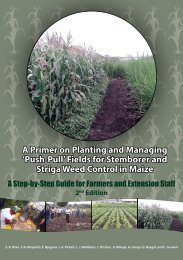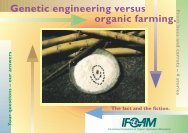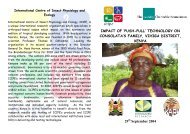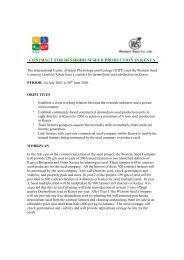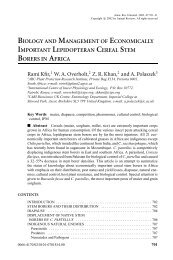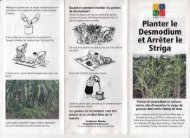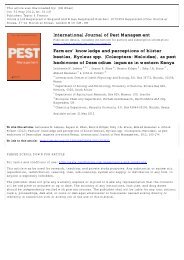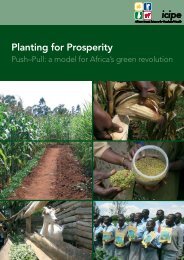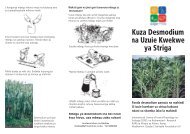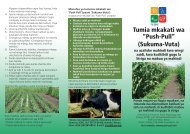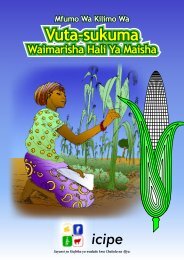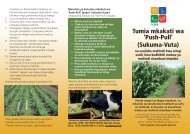The Royal Society Report - Push-Pull
The Royal Society Report - Push-Pull
The Royal Society Report - Push-Pull
You also want an ePaper? Increase the reach of your titles
YUMPU automatically turns print PDFs into web optimized ePapers that Google loves.
cannot hope to do justice to the complete issue. Instead<br />
we offer a tight focus on the possible contributions of<br />
biological science and technology, while remaining aware<br />
of the context in which this science sits and the necessity<br />
of a multidisciplinary approach. <strong>The</strong>re are countless<br />
aspects of food systems, such as aquaculture, livestock,<br />
consumption and supply chains that demand attention<br />
beyond the references we provide. Similarly, there are<br />
areas of expertise and technology, including social<br />
sciences, economics, climatology, engineering, chemistry<br />
and in particular the use of agrochemicals, that are relevant<br />
but beyond the scope of this report.<br />
Debates about the role of science and technology in food<br />
production have proved contentious in the past. Our report<br />
looks at a variety of approaches, and considers their future<br />
opportunities as well as the risks, complexities and uncertainties<br />
presented through research and implementation.<br />
As well as providing a rigorous scientific assessment, we<br />
hope this report can help to start a constructive debate<br />
about the future of agriculture around the world and the<br />
contribution that might be offered by UK science.<br />
This report’s next chapter assesses the technical and<br />
environmental constraints of food crop production such as<br />
water shortages, incidence of disease and rising<br />
temperatures. Chapter 3 considers in more detail the<br />
possibilities provided by the biological sciences for<br />
addressing some of these challenges. Chapter 4 addresses<br />
the impacts—intended and unintended—of different<br />
technological approaches to agriculture, considering<br />
environmental, health and socioeconomic issues. <strong>The</strong> final<br />
chapter contains our conclusions and recommendations<br />
for policy makers.<br />
Chapter 3 contains case studies of science and technology<br />
in different contexts to illustrate the complexity of agriculture<br />
and the necessity of specific solutions for specific problems.<br />
Our case studies tell stories of where, why and how science<br />
has made a difference to food production.<br />
1.10 Conduct of the study<br />
A working group chaired by Sir David Baulcombe FRS<br />
was established to undertake this study. <strong>The</strong> working<br />
group first met in July 2008 and had a further seven<br />
meetings. <strong>The</strong> full membership of the working group is<br />
given at the start of this report. <strong>The</strong> working group were<br />
shocked and saddened by the death of Professor Mike<br />
Gale FRS soon after the final meeting. This report has<br />
benefited hugely from his contributions and is dedicated<br />
to him.<br />
In order to obtain views from a wide range of experts, a<br />
call for evidence was issued on 7 August 2008 with a<br />
closing date of 6 October 2008. Responses were received<br />
from a range of individual academics, research institutes,<br />
industry representatives and non-governmental<br />
organisations. Details of the organisations and individuals<br />
who submitted written evidence are listed at the end of the<br />
report, and the evidence is available on the <strong>Royal</strong> <strong>Society</strong><br />
website (royalsociety.org).<br />
An oral evidence session at the <strong>Society</strong> and an evidencegathering<br />
workshop in India were held in October 2008.<br />
A workshop with UK-based non-governmental<br />
organisations was held in May 2009. <strong>Report</strong>s of<br />
these workshops are available on the <strong>Society</strong>’s website.<br />
All this evidence informed the working group’s<br />
discussions, conclusions and recommendations. We<br />
are grateful to everyone who responded to the call for<br />
evidence, participated in the workshops and submitted<br />
additional evidence.<br />
10 I October 2009 I Reaping the Benefits <strong>The</strong> <strong>Royal</strong> <strong>Society</strong>



